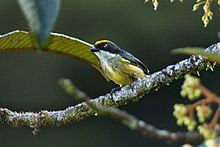Yellow-crowned flowerpecker
| Yellow-crowned flowerpecker | |
|---|---|

| |
| Scientific classification | |
| Domain: | Eukaryota |
| Kingdom: | Animalia |
| Phylum: | Chordata |
| Class: | Aves |
| Order: | Passeriformes |
| Family: | Dicaeidae |
| Genus: | Dicaeum |
| Species: | D. anthonyi
|
| Binomial name | |
| Dicaeum anthonyi (McGregor, 1914)
| |
The yellow-crowned flowerpecker (Dicaeum anthonyi) is a species of bird in the family Dicaeidae. It is endemic to Luzon Island in the Philippines. It was formerly conspecific with the Flame-crowned flowerpecker of Mindanao.[2] Its natural habitat is tropical moist montane forest. It is becoming rare due to habitat loss.
Description and taxonomy
[edit]EBird describes the bird as "A tiny bird of mossy montane forest and edge on Luzon. Male has glossy black upperparts, pale underparts (whiter on the throat), and the namesake yellow crown stripe. Female has olive upperparts. Similar to Bicolored Flowerpecker, but male Yellow-crowned has a bright crown patch and female has a more yellowish belly. Voice includes a high-pitched descending whistle and a sharp “tsik!” Treated by some taxonomies as subspecies of Flame-crowned Flowerpecker, which is endemic to Mindanao."[3]
Exhibits sexual dimorphism in which males have the eponymous yellow crown and vent while females are much more dull and have uniform olive color and does not the black upperparts[4]
It was formerly conspecific with the Flame-crowned flowerpecker but differs with its yellow crown and vent and yellowish belly.
Ecology and behavior
[edit]Feeds on small fruits, the nectar of mistletoes and flowers.Found singly, in pairs or mixed species flocks with other flowerpeckers and small birds. Often observed near fruiting and flowering trees.
Its breeding ecology is completely undescribed with no documentation of its mating habits, nest, eggs and fledgeling.[5]
Habitat and conservation status
[edit]It inhabits tropical moist montane forest from 1,500 to 2,000 meters above sea level.[4]
The International Union for Conservation of Nature assessed this species in 2023 as Least-concern. Prior to this, it was assessed as near threatened with its population being estimated as 10,000 to 19,999 mature individuals. This species is uncommon throughout its range.
The current assessment states that the population is supposedly stable. However, forest loss is a threat especially in its lower altitude limits which are more prone to legal and illegal logging, mining and conversion into farmland and road development.
It is recommended to investigate potential threats and quantify more precisely the population size of the species. Protect areas of suitable habitat and safeguard against deforestation.[6][7]
References
[edit]- ^ BirdLife International (2017). "Dicaeum anthonyi". IUCN Red List of Threatened Species. 2017. Retrieved 28 July 2021.
- ^ "Species Updates – IOC World Bird List". www.worldbirdnames.org. Retrieved 2021-05-27.
- ^ "Yellow-crowned Flowerpecker - eBird". ebird.org. Retrieved 2024-09-19.
- ^ a b Allen, Desmond (2020). Birds of the Philippines. Barcelona: Lynx and Birdlife International Field Guides. pp. 342–343.
- ^ Cheke, Robert; del Hoyo, Josep; Collar, Nigel; Mann, Clive; Bonan, Arnau; Kirwan, Guy M.; Rasmussen, Pamela C. (2023). "Yellow-crowned Flowerpecker (Dicaeum anthonyi), version 1.0". Birds of the World. doi:10.2173/bow.flcflo2.01. ISSN 2771-3105.
- ^ International), BirdLife International (BirdLife (2016-10-01). "IUCN Red List of Threatened Species: Dicaeum anthonyi". IUCN Red List of Threatened Species. Retrieved 2021-09-15.
- ^ IUCN (2023-03-03). Dicaeum anthonyi: BirdLife International: The IUCN Red List of Threatened Species 2023: e.T103776016A181041693 (Report). International Union for Conservation of Nature. doi:10.2305/iucn.uk.2023-1.rlts.t103776016a181041693.en.

